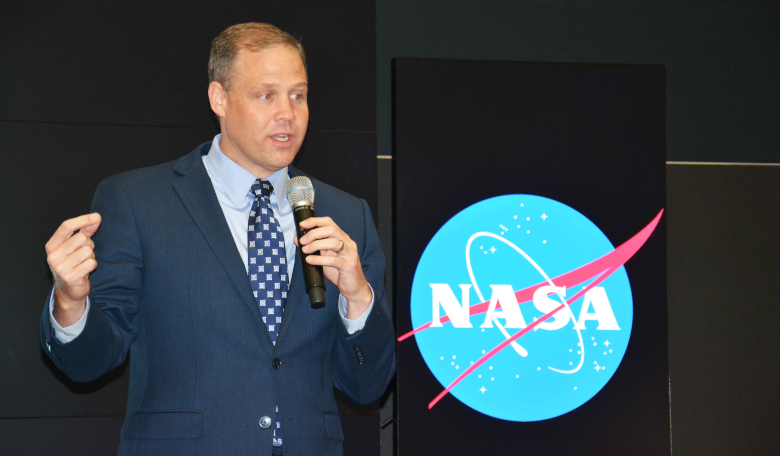NASA Administrator Jim Bridenstine told reporters Thursday that he doesn't know whether impeachment proceedings against United States President Donald Trump could jeopardisJim Bridenstinee the administration's proposal to land US astronauts on the Moon in 2024, four years sooner than previously planned.
SpacePolicyOnline.com's editor Marcia Smith posed the question during a half-hour question-and-answer session during the International Astronautical Congress taking place in Washington, DC, this week.
NASA's proposal to accelerate the next human landing and its associated missions, collectively called Artemis, hinges on a request to the US Congress for US$1.6 billion over and above what the administration asked for at the beginning of the country's fiscal 2020 federal budget negotiations. NASA officials have said just over US$500 million of the supplemental request is for the agency's Orion spacecraft and Space Launch System rocket programs needed for the missions; while the remainder would be a start toward the development of human landing craft.
Members of congressional funding committees have firmly asked for more details about the plan during public hearings dating back to May - especially about how much the program will cost in future years - and as recently as Oct. 16. During that hearing, Bridenstine - Trump's appointee to run the agency - acknowledged that NASA didn't expect to provide those figures until the agency turns in its fiscal 2021 budget request in February.
Meanwhile, the inquiry into an impeachment trial of Trump has gained momentum in the wake of the administration's dealings with the country of Ukraine. Will that further hurt Artemis' chances?
"The answer is, I honestly don't know," Bridenstine replied. "I will tell you we have strong bipartisan support. And I don't want to get bogged down in these other kinds of questions. I'm not saying it's not an appropriate question, but I don't want to get NASA bogged down in that. I don't pay any attention to it. My job is singular. I represent NASA, and I'm trying to make sure that we have a sustainable, long-term exploration and science programme that all of America can be proud of - and, in fact, our international partners can be proud of as well."
Bridenstine said he's been travelling around the US to meet with both Republicans - Trump's party - and Democrats and that the idea "is not partisan in any way, shape or form. What we're trying to achieve here is multi-generational in nature, not just spanning administrations but spanning generations."
He has frequently said one reason for the accelerated timeline is so that the next Moon landing might happen during a potential second Trump administration, to "retire political risk" of shifting legislative priorities.











